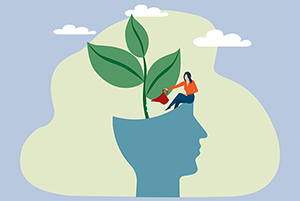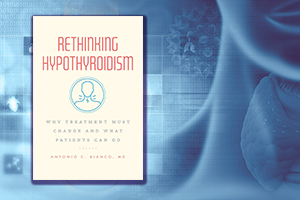



| By Dr. Ronald Hoffman
“When she’s dancing next to me”
“Blinding me with science – science!”
“Science!”
“I can hear machinery”
“Blinding me with science – science!”
“Science!”
–“She Blinded Me With Science,” words and music by Thomas Dolby, 1982

© Armonn | Dreamstime Stock Photos & Stock Free Images
Sometimes I think we get blinded by “science.” Like a couple of weeks ago when headlines blared that fish oil can cause prostate cancer, or a couple of months ago when the same media outlets proclaimed that meat and the dietary supplement carnitine cause heart disease, or lately when eminent “scientist” Dr. Paul Offit does the talk show circuit and mocks our use of supplements.
In a recent op-ed piece in the Sunday Review section of The New York Times entitled “Do Clinical Trials Work?” by Clifton Leaf (July 13, 2013), Leaf looks at the woeful state of medical progress based on expensive, arduous clinical trials. Billions of dollars are expended year after year, and yet we are left with a legacy of confusion about which drugs work and whether they’ll produce unforeseeable unacceptable side effects.
“In a famous 2005 paper published in The Journal of the American Medical Association, Dr. Ioannidis, an authority on statistical analysis, examined nearly four dozen high-profile trials that found a specific medical intervention to be effective. Of the 26 randomized, controlled studies that were followed up by larger trials (examining the same therapy in a bigger pool of patients), the initial finding was wholly contradicted in three cases (12 percent). And in another 6 cases (23 percent), the later trials found the benefit to be less than half of what was first reported.”
So, drugs often are approved on the scantest of evidence, are widely used, and only later is it found that they don’t work, or cause grievous harm.
Part of the problem is the inevitable bias that may creep in when a major pharmaceutical giant underwrites research for one of its new blockbuster drugs.
Another problem is the statistical method itself, susceptible to distortion and cherry-picking.
So what are we to do? Ignore science and simply base our choices on hunches? When it comes to diet, supplements and exercise, simply follow the dictum, “If it feels good, do it”? Are fundamental questions like “What should I eat?” even amenable to scientific investigation?
Clearly science paid off for advocates of chelation therapy like me who helped design the TACT study (Trial to Assess Chelation Therapy), which recently was found to be advantageous for heart attack survivors. We took a big gamble when we collaborated with the National Institutes of Health to undertake this 31 million dollar trial because even a well-funded, rigorous study sometimes can yield screwy results that don’t reflect the great outcomes we see in our clinics.
A negative result would have been the death knell of chelation. As it is, amid the biased climate of modern medicine, the positive results of TACT were treated with intense skepticism or, at best, with yawns.
And yet there are calls for abandoning the quest for answers that matter to us Americans who rely on natural therapies. Recently, The Wall Street Journal’s op-ed page (“Time to Sequester Insipid Research,” July 18, 2013) took aim at the National Center for Complementary & Alternative Medicine (NCCAM), the branch of the NIH that is entrusted to investigate natural practices:
“Many of the center’s projects are hardly essential to advancing scientific knowledge. For example, one NCCAM-funded study published in 2011 found that cranberry juice cocktail was no better than placebo at preventing recurring urinary-tract infections. Other studies include, ‘Metabolic and Immunologic Effects of Meditation,’ ‘Long-Term Chamomile Therapy of Generalized Anxiety Disorder,’ and ‘Restorative Yoga for Therapy of the Metabolic Syndrome.’”
I don’t know about you, but I don’t find the above-referenced research projects so patently absurd. The entire annual budget of NCCAM is a mere $130 million, yet more that six BILLION dollars have been spent to date on investigating the efficacy of the cancer drug Avastin, yielding few clear conclusions on whether this uber-expensive drug (upward of thirty thousand dollars per year) should be routinely deployed to treat cancer.
But I detect the outlines of a carefully orchestrated media campaign here. The Wall Street Journal editorial invokes Dr. Paul Offit’s old chestnut: “There is no such thing as alternative medicine. There’s only medicine that works and medicine that doesn’t.” Dr. Offit’s whirlwind media tour with his new book about alternative medicine snarkily entitled Do You Believe in Magic is receiving unprecedented uncritical press coverage.
So, according to that logic, we should pull the plug on NCCAM and at the same time permit billions of dollars of conventional medicine research to continue to deliver us unsatisfactory drugs that don’t work as advertised.
Part of the problem is our naïve belief that “science” will inexorably march on, delivering triumph after triumph in our quest for “truths” that will improve our lives. This misconception arises from an imperfect understanding of the scientific model. Science, at best, is a series of ever-evolving theoretical constructs that attempt to model reality with varying degrees of success but never fully embodies the truth.
Sophisticated theoretical physicists studying the behavior of atomic particles or the origins of the cosmos fully appreciate this and are humble to their scientific limitations, but the average layperson looks to the science pages of a newspaper to adjudicate basic health choices. The public wants ANSWERS, and they want them NOW. There’s no room for equivocation or inconsistency.
But facile answers are not what true science is about. Intelligent Medicine is about bringing a healthy dose of common sense to important debates about how to advance our well-being. Let’s pay attention to science and carefully interpret it but not let ourselves be blinded by it or by those who falsely claim its banner.
Though we think of declining estrogen as the hallmark of menopause, it's actually common for…

Up to 12 percent of Americans have ulcers at some point in life. Peptic ulcers…
Gallbladder disease is a modern illness. An estimated 20 million Americans have gallbladder disease. The…

We’re living longer, but cognitive decline threatens to rob us of quality of life in…

Dr. Antonio Bianco, recipient of the American Thyroid Association’s John B. Stanbury Thyroid Pathophysiology Medal,…

There’s a misconception among low-carb dieters. Many people believe a low-carb diet is much higher…

Leyla Weighs In: Eating for Energy and Emotional Well-Being

Our virtual voicemail is open 24/7, so there's no need to wait to submit your questions for Dr. Hoffman. Leave a message, and you may hear your question featured on the Intelligent Medicine radio program!